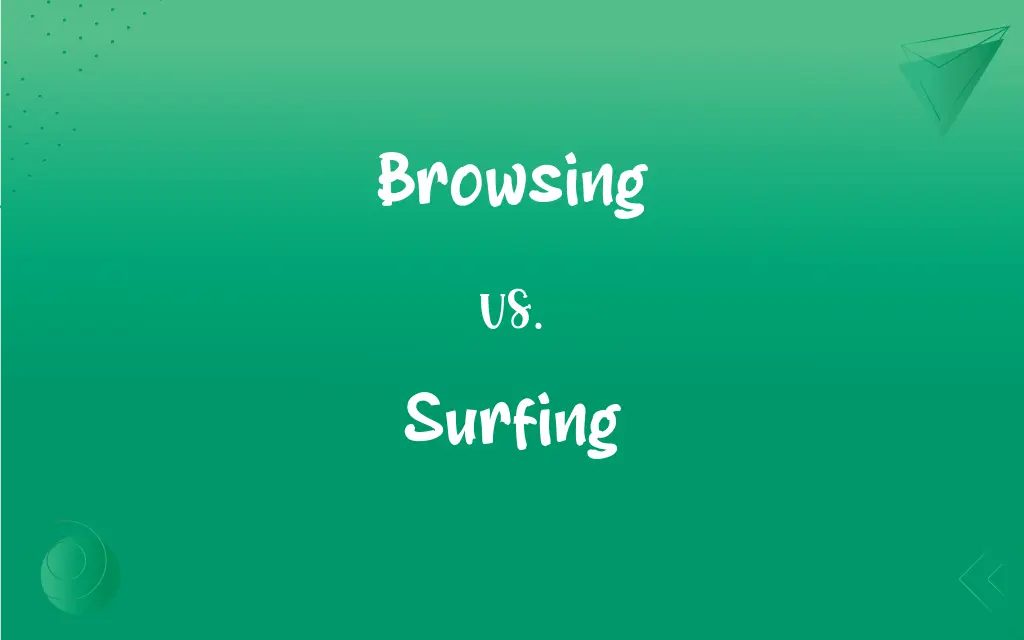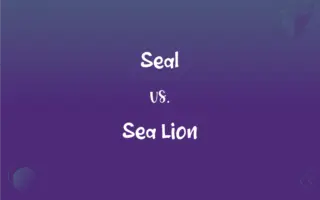Browsing vs. Surfing: What's the Difference?
Edited by Aimie Carlson || By Harlon Moss || Updated on October 11, 2023
Browsing implies purposeful navigation to specific sites or content, while surfing suggests more casual, random, or leisurely exploration of the internet.

Key Differences
Browsing, in a technical and digital context, is typically seen as a more directed and purposeful activity. It involves going through the internet or files with a specific intent or to find specific information. On the other hand, surfing, while also an internet navigation activity, often implies a lack of specific direction or purpose, more like skimming through different websites and content without a defined goal.
When you're browsing, you are often seeking something particular, such as a piece of information, a product, or a specific website. This could be akin to looking for a specific book in a library - you have a goal in mind. In contrast, when you’re surfing, you’re more like floating along on the waves of the internet, exploring various websites and allowing one piece of content to lead you to the next without a clear endpoint or target.
Browsing can be visualized as a focused activity where the internet user knows what they want and may use search engines to find it directly. It can be highly beneficial for users who want to save time and get to a specific point or answer quickly. Whereas surfing is often more leisurely, allowing the user to explore various topics, click on different links, and essentially "go with the flow" of the internet, which can be enjoyable but might not be as efficient.
To delve deeper, browsing is often characterized by using specific keywords in search engines to find required information or visiting known websites directly. It's somewhat like shopping with a list, ensuring that what is needed is what is sought after and obtained. Conversely, surfing might involve clicking on various links, maybe following a chain of thoughts or just seeing where the internet takes you, somewhat akin to window shopping without a desire to buy something specific.
In a nutshell, browsing is a focused, targeted activity, often employed when one seeks particular information or a specific online destination. Surfing, however, is usually a more relaxed, non-linear journey through various websites and pages, potentially discovering new content without actively searching for it.
ADVERTISEMENT
Comparison Chart
Intent
Purposeful, with clear objectives
Casual, often without specific objectives
Directionality
Directed and focused
Unstructured, free-flowing
Time and Efficiency
Time-efficient
Can be time-consuming
User Engagement
Might not explore beyond need
May explore varied, unrelated content
Usage Example
Looking for a specific product
Randomly exploring various websites
ADVERTISEMENT
Browsing and Surfing Definitions
Browsing
Scanning through books or articles superficially.
Instead of reading every detail, she was just browsing the newspaper.
Surfing
Moving smoothly over a surface or through a medium.
The stone was perfectly flat, making it ideal for surfing across the pond.
Browsing
Perusing through items or content, often in a leisurely manner.
During his vacation, he enjoyed browsing through local markets.
Surfing
Riding on a wave toward the shore using a surfboard.
He spent the entire summer surfing at the beach.
Browsing
Using a software tool to navigate through the internet.
Every morning, he starts his day by browsing the latest news online.
Surfing
Navigating through the internet without a specific aim.
She spent her evening surfing and discovered a new blog.
Browsing
Searching through internet content, generally with a purpose.
She was browsing online stores for a new dress.
Surfing
Exploring various topics on the internet serendipitously.
Through surfing, he stumbled upon a forum of vintage car enthusiasts.
Browsing
Looking through information quickly without deep attention.
He spent an hour browsing through the magazine.
Surfing
Searching through television channels casually.
Bored with the show, she started surfing through other channels.
Browsing
To inspect something leisurely and casually
Browsed through the map collection for items of interest.
Surfing
The sport of riding toward the shore on the forward slope of a wave, especially while standing or lying on a surfboard. Also called surfboarding.
Surfing
(Informal) The activity of casually looking at something that offers numerous options, such as the internet or television.
Surfing
Present participle of surf
Surfing
The pastime or sport of riding surf on a surfboard.
Surfing
The activity of browsing the Internet.
Surfing
The sport of riding a surfboard toward the shore on the crest of a wave
FAQs
Which activity, browsing or surfing, is more likely to be time-efficient?
Browsing is usually more time-efficient as it is often more directed and purposeful.
Is surfing related only to internet activity?
No, surfing can refer to switching through TV channels or even physically riding waves on a surfboard.
Does surfing always imply an absence of intent?
Not always, but surfing is generally associated with a more leisurely and undirected exploration of content.
Can browsing be done without the internet?
Yes, browsing can refer to looking through items or information offline too, such as browsing through books at a store.
Can I use the term browsing when referring to looking through a magazine?
Yes, browsing can be used to describe casually looking through a magazine without reading it thoroughly.
Does browsing always involve using a search engine?
Not necessarily; browsing can also involve directly visiting known websites or accessing saved bookmarks.
Can surfing lead to discovering new information?
Yes, surfing, with its random navigation, can lead to unexpected discoveries on the internet.
What do you need to facilitate browsing online?
To browse online, you’ll typically need a device with internet access and a web browser.
Is there a negative side to surfing online?
Yes, surfing online without aim can lead to wasted time and potential exposure to unwanted content.
Do people use the internet more for browsing or surfing?
It varies; some use it for specific purposes (browsing), while others enjoy aimless exploration (surfing).
Can a single internet session involve both browsing and surfing?
Yes, a user might start with a specific intent (browsing) and later explore without aim (surfing).
What does it mean to go “web surfing”?
Web surfing implies navigating through various web pages on the internet without a definite purpose.
What does browsing imply in internet terms?
Browsing refers to navigating through the internet or websites typically with a specific objective or purpose in mind.
Is surfing a purposeful internet activity?
Generally, surfing is considered a more casual and aimless internet activity, moving from one webpage to another without specific intent.
Why is intentional internet use typically referred to as browsing?
Browsing implies a certain level of focused activity or seeking, which aligns with intentional internet use.
Is there a tool specifically used for surfing the internet?
No specific tool for surfing, but a web browser (like Chrome, Firefox) facilitates both surfing and browsing on the internet.
Can I use browsing and surfing interchangeably?
Sometimes, but considering their nuanced differences, browsing suggests purposeful activity while surfing implies casual exploration.
What’s an example of browsing in everyday life?
Looking through different products in a supermarket with a shopping list is akin to browsing.
Can you browse through television channels?
The term typically used for casually exploring TV channels is "channel surfing," not browsing.
Is it possible to use search engines while surfing?
Yes, search engines can be used during surfing, though the navigation might be more random and explorative.
About Author
Written by
Harlon MossHarlon is a seasoned quality moderator and accomplished content writer for Difference Wiki. An alumnus of the prestigious University of California, he earned his degree in Computer Science. Leveraging his academic background, Harlon brings a meticulous and informed perspective to his work, ensuring content accuracy and excellence.
Edited by
Aimie CarlsonAimie Carlson, holding a master's degree in English literature, is a fervent English language enthusiast. She lends her writing talents to Difference Wiki, a prominent website that specializes in comparisons, offering readers insightful analyses that both captivate and inform.































































